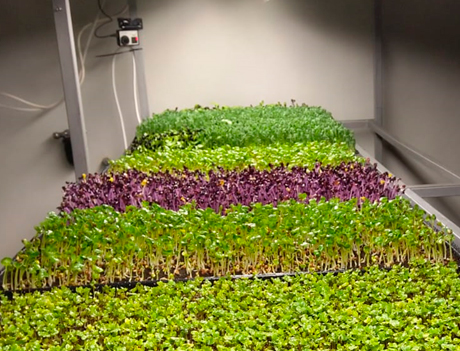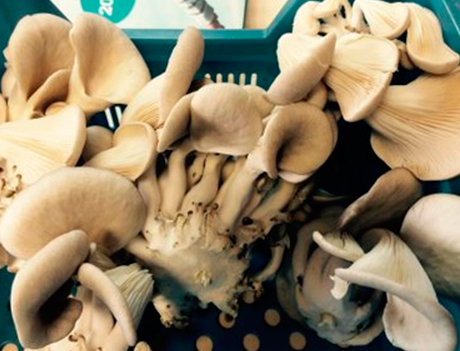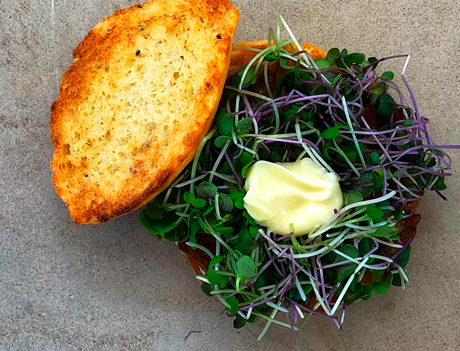This case study is about Kopjezwam, an urban farm located in Flanders producing microgreens and mushrooms.
Kopjezwam represents an innovative model of urban and multifunctional farm, strongly devoted to local production. Its business model is built around an innovative finance mixture of crowdlending (in the form of win-win) and crowdfunding.
Daniël Cromphout is one of the 9 shareholders responsible for the financial and business aspects at Kopjezwam. Daniel is a former banker who defines himself as a “modern farmer” as he works part-time in his own financial consultancy on innovative finance for farmers and partially at Kopjezwam. He is an innovative farmer, with strong entrepreneurial and communication skills and a professional knowledge of finance.
![]() Name: Daniël Cromphout.
Name: Daniël Cromphout.
![]() Birth year: 1963
Birth year: 1963
![]() Gender: Male.
Gender: Male.
![]() Education: Daniël defines himself as a “non-classical farmer”. With a Master’s degree in translation, Daniël worked for 33 years in the banking sector at KBC.
Education: Daniël defines himself as a “non-classical farmer”. With a Master’s degree in translation, Daniël worked for 33 years in the banking sector at KBC.
![]() Occupation: When he was working at KBC bank dealing with agricultural topics, Daniël did a strategic exercise where he explored urban agriculture. Then, he left KBC and founded a consultancy in new business models for urban farmers, where he is currently working part-time. He came in contact with the people f rom Kopjezwam, an urban farm producing mushrooms and microgreens, and joined them as a shareholder and “modern farmer”. At Kopjezwam, Daniël specifically takes care of the financial aspects and of the business side. When asked if he can be defined as a farmer, he answers: “What’s a farmer? In my point of view, Kopjezwam is a farm because we produce primary products (mushrooms, microgreens) and I am part of an agricultural enterprise. So, we are farmers. Of course, if you look at a more traditional definition of farmers, then someone would say I am not a farmer. The modern farmer, in my point of view, is an entrepreneur”.
Occupation: When he was working at KBC bank dealing with agricultural topics, Daniël did a strategic exercise where he explored urban agriculture. Then, he left KBC and founded a consultancy in new business models for urban farmers, where he is currently working part-time. He came in contact with the people f rom Kopjezwam, an urban farm producing mushrooms and microgreens, and joined them as a shareholder and “modern farmer”. At Kopjezwam, Daniël specifically takes care of the financial aspects and of the business side. When asked if he can be defined as a farmer, he answers: “What’s a farmer? In my point of view, Kopjezwam is a farm because we produce primary products (mushrooms, microgreens) and I am part of an agricultural enterprise. So, we are farmers. Of course, if you look at a more traditional definition of farmers, then someone would say I am not a farmer. The modern farmer, in my point of view, is an entrepreneur”.
![]() Farm location: Kopjezwam has one farm in Bruges (Sint-pieterskaai) and is currently opening one in Leuven (Molens Van Orshoven).
Farm location: Kopjezwam has one farm in Bruges (Sint-pieterskaai) and is currently opening one in Leuven (Molens Van Orshoven).
![]() Farm Area in ha: Kopjezwam farm has a productive area of around 20 m2 inside industrial buildings.
Farm Area in ha: Kopjezwam farm has a productive area of around 20 m2 inside industrial buildings.
![]() Farm description: Kopjezwam is an urban farm producing microgreens and mushrooms. Kopjezwam is based on a model of shareholders: it has 9 shareholders, each working only part-time (Daniël works also as a consultant).
Farm description: Kopjezwam is an urban farm producing microgreens and mushrooms. Kopjezwam is based on a model of shareholders: it has 9 shareholders, each working only part-time (Daniël works also as a consultant).
Along with producing primary products, Kopjezwam offers a selection of processed products, such as mushrooms burgers. The business model is to produce locally, only for the market in Bruges. The products are mostly sold directly to the consumers (B2C), but also to local and special stores, cafes and restaurants (B2B).
Kopjezwam can be defined as a multifunctional farm, because they offer on-farm sales. Along with offering quality production, they are planning to start training/didactic activities, such as workshops about production, urban agriculture, and cooking.
Created 5 years ago, Kopjezwam has an innovative finance model. It is based on a “finance” mix: a combination of crowdlending (in the form of win-win) and crowdfunding.
Win-win is an incentive instrument created by the Flemish government. It is a form of crowdlending, where usually friends or family members lend money to projects (or start-ups). The lenders give money but take no shares of the company and the borrowers need to pay back the money regularly, with very low interest rates. The big advantage for investors in participating in young enterprises is that they receive fiscal reductions and guarantees from the government. For example, an investor can receive 30% or 40% return on investment.
At Kopjezwam, they are planning to use crowdfunding to raise money and broaden the network of “ambassadors” of their project. Nevertheless, the Kopjezwam farmers prefer crowdlending and win-win because, unlike in crowdfunding, they remain the only shareholders, without having to give away shares of the company.
According to Daniël: “The best is to create a finance mix, such as a combination of crowdfunding, crowdlending (i.e.win-win in Flanders) and a classic bank loan. It’s difficult to set this in a ‘menu’: it’s really individual ‘customization’. Each business case is different”.
According to Daniël, it is really important to have a good business plan, a compelling story and a strong network of advisors who truly believe in the project. In his opinion, producing quality products is not enough. He comments: “The problem with a lot of traditional farmers is that they have good products, but they talk too much from the point of view of a farmer and not from the point of view of an entrepreneur”.
According to Daniël, the innovative finance mix of Kopjezwam has been successful because: ‘Without a finance mix, there is no ‘Kopjezwam: that’s the reality. A traditional bank looks only to the past and demands a lot of guarantees”.
The main impacts of this innovative finance mix is the (a) reduction of risks, (b) the increase in income – because farmers have more money to invest with very low interest rates -, and (c) the creation of a network of ambassadors. On this aspect, Daniël highlights: “When someone invests in Kopjezwam, they believe in it and talk about it: they are not only an investor, but an ambassador”. Kopjezwam keeps a strong communication link with their investors through a newsletter,, and an open invitation to come to Bruges and taste the products.
Concerning future plans, Daniël and his team want to expand Kopjezwam business, by creating other Kopjezwams in other Belgian and Flemish cities. They also want to explore the sustainability aspects (e.g. no waste, zero impact, use electric bikes) and they want to communicate on the potential of agricultural production in cities.
“Inform you well. Think about your story: what is your story as a farmer? How do I produce, what is my unique way of produce? How can I convince someone to invest in my business?Have a good story! If you say: “I am sustainable’ you have to show why you are sustainable, put it in your story!”
![]() Training experiences and gaps: Daniël did not receive a specific training for managing the farm, but in his case, his past work experience in finance was very useful. In addition to this, one of the shareholders at Kopjezwam is a teacher in an agricultural school, so specific training was not needed.
Training experiences and gaps: Daniël did not receive a specific training for managing the farm, but in his case, his past work experience in finance was very useful. In addition to this, one of the shareholders at Kopjezwam is a teacher in an agricultural school, so specific training was not needed.
In his opinion, the main competences needed in his work are the classical competences of an entrepreneur: “You need to produce very good products and you need people that can sell the products. A good entrepreneur cannot do everything on his own, but he knows what he can do very well and where he needs cooperation. A farmer needs a good business model. Only producing is not enough.”
![]() Final considerations: “Innovation” is the key word summarizing this case study in one word. Kopjezwam is an innovative farm (urban, local, multifunctional, circular) with an innovative financing model (a mix of crowdlending in the form of win-win and crowdfunding).
Final considerations: “Innovation” is the key word summarizing this case study in one word. Kopjezwam is an innovative farm (urban, local, multifunctional, circular) with an innovative financing model (a mix of crowdlending in the form of win-win and crowdfunding).
Daniël Cromphout mirrors this innovative spirit: he is a part-time modern farmer with professional financial knowledge, a shareholder, and an entrepreneur. He is aware of societal challenges (for example on environment) and he is devoted to develop solutions. His future plans at Kopjezwam are to further explore the potential of circularity (e.g. producing zero waste) and to invest in multiple aspects of sustainability along the supply chain. Finally, Kopjezwam has a broad “political” mission: to convince decision-makers and the public about the potential of agricultural production in cities.





